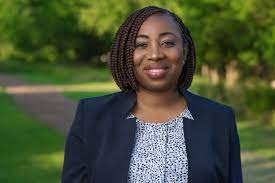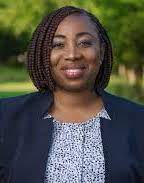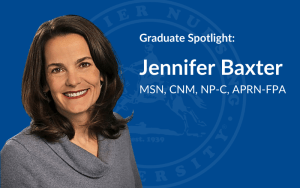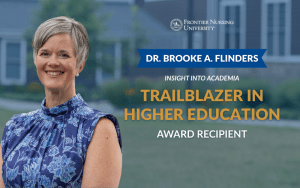 When Frontier Nursing University alumna Dr. Elizabeth Akinyemi, DNP, FNP, came to the United States from Nigeria, she had no plans to become a nurse. She dreamed of becoming a doctor, though teaching might have been an even better choice, given her tendency to quiz her patients.
When Frontier Nursing University alumna Dr. Elizabeth Akinyemi, DNP, FNP, came to the United States from Nigeria, she had no plans to become a nurse. She dreamed of becoming a doctor, though teaching might have been an even better choice, given her tendency to quiz her patients.
“I describe myself as a fierce patient educator. I love to teach my patients,” said Dr. Akinyemi, who worked for four years as a family nurse practitioner at Baylor Scott & White Health, the largest not-for-profit healthcare system in Texas with more than 50 hospitals and 800 additional patient care sites. “I won’t let you leave the clinic until you are sure about what you are doing. Lack of education can lead to unnecessary clinic visits and poor patient outcomes. I’ll ask my patients questions during the visit to gauge their attention and to assess their understanding of instructions. Spending that extra minute or two reinforcing knowledge goes a long way in ensuring patients are well educated about their health, that they have the tools they need, and that they know what to do if things get worse. My patients leave visits feeling like they have a working plan. It is reassuring to them. Nursing taught me that.”
It was a lesson she almost never learned. An excellent student at the University of Ibadan in Nigeria, she came to the U.S. when she was 20 years old and stayed with her aunt in Houston, and began attending college. The high costs of medical school were more than she had anticipated, but chemical engineering, not nursing, was her next choice.
Dr. Akinyemi did not enjoy her first U.S. college in Houston, so she transferred to the University of Nebraska in Lincoln. That experience was much more to her liking. Not only did she meet her husband, Ladi Akinyemi, there, but she also found a welcoming community and life-long friends.
“Nebraska was predominantly Caucasian in population, which was a new experience for me coming from Nigeria,” Dr. Akinyemi laughed, “but it was a great experience. Nebraskans are very welcoming, and the University in Lincoln attracts so many different people from all over the world. The beauty of it is that I got to contribute to the diversity in the university community and in Lincoln. I still have family and friends in Nebraska, and we visit at least once a year.”
 “I had never been in an environment that just brings you in, includes you, makes you feel loved and cared for. The way I think about healthcare has definitely been transformed, and this is a result of going through Frontier’s very objective DNP program. I came out of the program feeling more confident about my ability to contribute positively to any clinical quality improvement initiative.”
“I had never been in an environment that just brings you in, includes you, makes you feel loved and cared for. The way I think about healthcare has definitely been transformed, and this is a result of going through Frontier’s very objective DNP program. I came out of the program feeling more confident about my ability to contribute positively to any clinical quality improvement initiative.”
– Dr. Elizabeth Akinyemi, FNU Alumna
Dr. Akinyemi graduated with a degree in chemical engineering and found a job in that field. A year later, she and her husband had their first child. She became a full-time mom but knew she would return to work eventually. As that time approached, Dr. Akinyemi realized that chemical engineering was not for her.
“I did not take into consideration a core piece of my personality,” Akinyemi said. “Significance is one of my top strengths – what I do has to be meaningful to me. One of my other top strengths is being a relator. I love to connect with people”
Being isolated in a pilot lab and with little in the way of interactions, she found chemical engineering unfulfilling. Two years later, she had her second child and continued to be a full-time mother, raising her two young children, cherishing that time while also keeping an eye on her professional future. If chemical engineering was out, what was in?
“I got interested in nursing because I had used a pediatric nurse practitioner for my children, and she was beyond amazing,” Dr. Akinyemi said. “She would educate me and give me a lot of information. I never felt rushed during our visits and always felt like my confidence was boosted in my knowledge of caring for my young kids. She inspired me and became my mentor.”
After five years as a full-time mother, Dr. Akinyemi went through the University of Nebraska’s one-year accelerated bachelor’s in nursing degree program, graduating with highest distinction in 2012. The Akinyemi’s then moved to Austin, Texas, where she found a job as a registered nurse. She enrolled part-time at Texas A&M-Corpus Christi, working toward becoming a nurse practitioner. Akinyemi’s first job as a nurse practitioner was at a Federally Qualified Health Center (FQHC) in the Austin area.
“I enjoy working with underinsured and underrepresented, vulnerable or just neglected,” Dr. Akinyemi said. “I loved it, but it’s an extremely busy environment with many hours spent at home after work catching up on charting. Anyone who works in that environment knows that you’re overworked and underpaid. With my kids being school-age, I just didn’t have a good work-family life balance. I worked there for about a year and a half and then switched to a different role at Baylor Scott & White.”
Dr. Akinyemi came to understand that the reason a career in nursing didn’t occur to her sooner was that nurses in Nigeria play a very different role than nurses in the U.S. do.
“I didn’t really know much about the nursing model in the U.S.,” she said. “Being raised in a different country, you don’t know what you don’t know. Nurses do so much more here in the U.S. In Nigeria, I feel like nursing is almost overlooked. This could also be because medicine, engineering, and law are valued in that society as more prestigious. Here in the U.S, there’s so much that you have to know as a nurse. It fulfilled the need that I always had. The nursing model is so patient-centric and patient-focused and all about building trust. As nurses, this is just who we are. We are skilled at building trust. It’s a great honor and privilege to be in this position.”
At Baylor Scott & White, Akinyemi worked with Frontier Nursing alumna Tarnia Newton (DNP, Class 28). Newton suggested getting her Doctor of Nursing Practice (DNP), but Dr. Akinyemi was skeptical about how much it would really advance her career. She questioned what she would learn that she didn’t already know.
“Tarnia had a different way of thinking and looking at problems,” Dr. Akinyemi said. “This is what the DNP does. It helps you become more analytic and a problem solver who tries to figure out root causes and solutions. There was this difference between Tarnia and me. She sold the Frontier Nursing DNP, and I bought into it. Frontier was the only place I applied to.”
Even though the pandemic forced her to attend Frontier Bound virtually, Dr. Akinyemi quickly connected to the university and her classmates.
“I had never been in an environment that just brings you in, includes you, makes you feel loved and cared for,” she said.
She also found the curriculum to be different and challenging in ways she hadn’t expected. She learned about shared decision-making and enjoyed seeing how the foundation established in the early classes built up to more and more advanced ideas and concepts. It was difficult and rewarding at the same time.
“It’s a different kind of learning,” she said. “In my past learning, you give me the material, I study it, I’m confident, I take the exam, and I move on. In the DNP, you’re trying to discover what you need to learn.”
At the end of the DNP program, students complete a quality improvement project, usually in their place of employment. Dr. Akinyemi’s project was focused on improving hypertension. She implemented it at her clinic, which fully embraced and participated in the project. Akinyemi hopes to publish her paper “Increasing Effective Care of High Blood Pressure Using“ and intends to present it at the Institute for Healthcare Improvement (IHI) conference.
 “This is the best educational program that I’ve ever attended, and I’ve attended five universities. I’ve never felt more connected to a place, more encouraged. For this to be an online program and still have that impact, you know that Frontier is doing something very well.”
“This is the best educational program that I’ve ever attended, and I’ve attended five universities. I’ve never felt more connected to a place, more encouraged. For this to be an online program and still have that impact, you know that Frontier is doing something very well.”
– Dr. Elizabeth Akinyemi, FNU Alumna
“The way I think about healthcare has definitely been transformed, and this is a result of going through Frontier’s very objective DNP program,” Dr. Akinyemi said. “I came out of the program feeling more confident about my ability to contribute positively to any clinical quality improvement initiative.”
While at Baylor Scott & White, Akinyemi filled many roles. She worked as a family nurse practitioner in one of their family medicine clinics, which is where she did her quality improvement project. She also worked in the walk-in clinic, which provided urgent care, and began doing more and more telemedicine as the pandemic wore on.
Dr. Akinyemi completed her DNP in March of 2022. She also continued to work while raising her family, which now includes three children, ages 15, 13, and 5. Balancing work life and home life is always challenging, but she is excited about the solution she has found.
She plans to continue in family practice and the telemedicine space for now and hopefully explore roles in administration and academia in the future. “We will see where it all leads,” she said. “I’m trying to balance moving ahead in my career while making sure I’m carrying my family along. I really hope that someday I can come back to Frontier and teach. That is one of my hopes. It would be great to encourage the next generation of students.”
She credits all of her FNU instructors and classmates who helped her acquire her DNP, but she especially acknowledges DNP clinical faculty Dr. Diana Jolles, Ph.D., CNM, for her tutelage and leadership.
“Dr. Jolles is awesome,” Akinyemi said. “She’s an amazing human being, instructor, and mentor. She carried our cohort group very well. She’s very humble and easy to connect with.”
It’s a model of instruction she hopes to emulate with her patients and future students.
“This is the best educational program that I’ve ever attended, and I’ve attended five universities,” Dr. Akinyemi said of FNU. “I’ve never felt more connected to a place, more encouraged. For this to be an online program and still have that impact, you know that Frontier is doing something very well.”






















 Carrie Belin is an experienced board-certified Family Nurse Practitioner and a graduate of the Johns Hopkins DNP program, Johns Hopkins Bloomberg School of Public Health, Georgetown University School of Nursing, and Johns Hopkins School of Nursing. She has also completed fellowships at Georgetown and the University of California Irvine.
Carrie Belin is an experienced board-certified Family Nurse Practitioner and a graduate of the Johns Hopkins DNP program, Johns Hopkins Bloomberg School of Public Health, Georgetown University School of Nursing, and Johns Hopkins School of Nursing. She has also completed fellowships at Georgetown and the University of California Irvine. Angie has been a full-scope midwife since 2009. She has experience in various birth settings including home, hospital, and birth centers. She is committed to integrating the midwifery model of care in the US. She completed her master’s degree in nurse-midwifery at Frontier Nursing University (FNU) and her Doctorate at Johns Hopkins University. She currently serves as the midwifery clinical faculty at FNU. Angie is motivated by the desire to improve the quality of healthcare and has led quality improvement projects on skin-to-skin implementation, labor induction, and improving transfer of care practices between hospital and community midwives. In 2017, she created a short film on skin-to-skin called
Angie has been a full-scope midwife since 2009. She has experience in various birth settings including home, hospital, and birth centers. She is committed to integrating the midwifery model of care in the US. She completed her master’s degree in nurse-midwifery at Frontier Nursing University (FNU) and her Doctorate at Johns Hopkins University. She currently serves as the midwifery clinical faculty at FNU. Angie is motivated by the desire to improve the quality of healthcare and has led quality improvement projects on skin-to-skin implementation, labor induction, and improving transfer of care practices between hospital and community midwives. In 2017, she created a short film on skin-to-skin called 










 Justin C. Daily, BSN, RN, has ten years of experience in nursing. At the start of his nursing career, Justin worked as a floor nurse on the oncology floor at St. Francis. He then spent two years as the Director of Nursing in a small rural Kansas hospital before returning to St. Francis and the oncology unit. He has been in his current position as the Chemo Nurse Educator for the past four years. He earned an Associate in Nurse from Hutchinson Community College and a Bachelor of Science in Nursing from Bethel College.
Justin C. Daily, BSN, RN, has ten years of experience in nursing. At the start of his nursing career, Justin worked as a floor nurse on the oncology floor at St. Francis. He then spent two years as the Director of Nursing in a small rural Kansas hospital before returning to St. Francis and the oncology unit. He has been in his current position as the Chemo Nurse Educator for the past four years. He earned an Associate in Nurse from Hutchinson Community College and a Bachelor of Science in Nursing from Bethel College. Brandy Jackson serves as the Director of Undergraduate Nursing Programs and Assistant Educator at Wichita State University and Co-Director of Access in Nursing. Brandy is a seasoned educator with over 15 years of experience. Before entering academia, Brandy served in Hospital-based leadership and Critical Care Staff nurse roles. Brandy is passionate about equity in nursing education with a focus on individuals with disabilities. Her current research interests include accommodations of nursing students with disabilities in clinical learning environments and breaking down barriers for historically unrepresented individuals to enter the nursing profession. Brandy is also actively engaged in Interprofessional Education development, creating IPE opportunities for faculty and students at Wichita State. Brandy is an active member of Wichita Women for Good and Soroptimist, with the goal to empower women and girls. Brandy is a TeamSTEPPS master trainer. She received the DASIY Award for Extraordinary Nursing Faculty in 2019 at Wichita State University.
Brandy Jackson serves as the Director of Undergraduate Nursing Programs and Assistant Educator at Wichita State University and Co-Director of Access in Nursing. Brandy is a seasoned educator with over 15 years of experience. Before entering academia, Brandy served in Hospital-based leadership and Critical Care Staff nurse roles. Brandy is passionate about equity in nursing education with a focus on individuals with disabilities. Her current research interests include accommodations of nursing students with disabilities in clinical learning environments and breaking down barriers for historically unrepresented individuals to enter the nursing profession. Brandy is also actively engaged in Interprofessional Education development, creating IPE opportunities for faculty and students at Wichita State. Brandy is an active member of Wichita Women for Good and Soroptimist, with the goal to empower women and girls. Brandy is a TeamSTEPPS master trainer. She received the DASIY Award for Extraordinary Nursing Faculty in 2019 at Wichita State University.  Dr. Sabrina Ali Jamal-Eddine is an Arab-disabled queer woman of color with a PhD in Nursing and an interdisciplinary certificate in Disability Ethics from the University of Illinois Chicago (UIC). Dr. Jamal-Eddine’s doctoral research explored spoken word poetry as a form of critical narrative pedagogy to educate nursing students about disability, ableism, and disability justice. Dr. Jamal-Eddine now serves as a Postdoctoral Research Associate in UIC’s Department of Disability and Human Development and serves on the Board of Directors of the National Organization of Nurses with Disabilities (NOND). During her doctoral program, Sabrina served as a Summer Fellow at a residential National Endowment of the Humanities (NEH) Summer Institute at Arizona State University (2023), a summer fellow at Andrew W. Mellon’s National Humanities Without Walls program at University of Michigan (2022), a Summer Research Fellow at UC Berkeley’s Othering & Belonging Institute (2021), and an Illinois Leadership Education in Neurodevelopmental and related Disabilities (LEND) trainee (2019-2020).
Dr. Sabrina Ali Jamal-Eddine is an Arab-disabled queer woman of color with a PhD in Nursing and an interdisciplinary certificate in Disability Ethics from the University of Illinois Chicago (UIC). Dr. Jamal-Eddine’s doctoral research explored spoken word poetry as a form of critical narrative pedagogy to educate nursing students about disability, ableism, and disability justice. Dr. Jamal-Eddine now serves as a Postdoctoral Research Associate in UIC’s Department of Disability and Human Development and serves on the Board of Directors of the National Organization of Nurses with Disabilities (NOND). During her doctoral program, Sabrina served as a Summer Fellow at a residential National Endowment of the Humanities (NEH) Summer Institute at Arizona State University (2023), a summer fellow at Andrew W. Mellon’s National Humanities Without Walls program at University of Michigan (2022), a Summer Research Fellow at UC Berkeley’s Othering & Belonging Institute (2021), and an Illinois Leadership Education in Neurodevelopmental and related Disabilities (LEND) trainee (2019-2020). Vanessa Cameron works for Vanderbilt University Medical Center in Nursing Education & Professional Development. She is also attending George Washington University and progressing towards a PhD in Nursing with an emphasis on ableism in nursing. After becoming disabled in April 2021, Vanessa’s worldview and perspective changed, and a recognition of the ableism present within healthcare and within the culture of nursing was apparent. She has been working since that time to provide educational foundations for nurses about disability and ableism, provide support for fellow disabled nursing colleagues, and advocate for the disabled community within healthcare settings to reduce disparities.
Vanessa Cameron works for Vanderbilt University Medical Center in Nursing Education & Professional Development. She is also attending George Washington University and progressing towards a PhD in Nursing with an emphasis on ableism in nursing. After becoming disabled in April 2021, Vanessa’s worldview and perspective changed, and a recognition of the ableism present within healthcare and within the culture of nursing was apparent. She has been working since that time to provide educational foundations for nurses about disability and ableism, provide support for fellow disabled nursing colleagues, and advocate for the disabled community within healthcare settings to reduce disparities. Dr. Lucinda Canty is a certified nurse-midwife, Associate Professor of Nursing, and Director of the Seedworks Health Equity in Nursing Program at the University of Massachusetts Amherst. She earned a bachelor’s degree in nursing from Columbia University, a master’s degree from Yale University, specializing in nurse-midwifery, and a PhD from the University of Connecticut. Dr. Canty has provided reproductive health care for over 29 years. Her research interests include the prevention of maternal mortality and severe maternal morbidity, reducing racial and ethnic health disparities in reproductive health, promoting diversity in nursing, and eliminating racism in nursing and midwifery.
Dr. Lucinda Canty is a certified nurse-midwife, Associate Professor of Nursing, and Director of the Seedworks Health Equity in Nursing Program at the University of Massachusetts Amherst. She earned a bachelor’s degree in nursing from Columbia University, a master’s degree from Yale University, specializing in nurse-midwifery, and a PhD from the University of Connecticut. Dr. Canty has provided reproductive health care for over 29 years. Her research interests include the prevention of maternal mortality and severe maternal morbidity, reducing racial and ethnic health disparities in reproductive health, promoting diversity in nursing, and eliminating racism in nursing and midwifery. Dr. Lisa Meeks is a distinguished scholar and leader whose unwavering commitment to inclusivity and excellence has significantly influenced the landscape of health professions education and accessibility. She is the founder and executive director of the DocsWithDisabilities Initiative and holds appointments as an Associate Professor in the Departments of Learning Health Sciences and Family Medicine at the University of Michigan.
Dr. Lisa Meeks is a distinguished scholar and leader whose unwavering commitment to inclusivity and excellence has significantly influenced the landscape of health professions education and accessibility. She is the founder and executive director of the DocsWithDisabilities Initiative and holds appointments as an Associate Professor in the Departments of Learning Health Sciences and Family Medicine at the University of Michigan. Dr. Nikia Grayson, DNP, MSN, MPH, MA, CNM, FNP-C, FACNM (she/her) is a trailblazing force in reproductive justice, blending her expertise as a public health activist, anthropologist, and family nurse-midwife to champion the rights and health of underserved communities. Graduating with distinction from Howard University, Nikia holds a bachelor’s degree in communications and a master’s degree in public health. Her academic journey also led her to the University of Memphis, where she earned a master’s in medical anthropology, and the University of Tennessee, where she achieved both a master’s in nursing and a doctorate in nursing practice. Complementing her extensive education, she completed a post-master’s certificate in midwifery at Frontier Nursing University.
Dr. Nikia Grayson, DNP, MSN, MPH, MA, CNM, FNP-C, FACNM (she/her) is a trailblazing force in reproductive justice, blending her expertise as a public health activist, anthropologist, and family nurse-midwife to champion the rights and health of underserved communities. Graduating with distinction from Howard University, Nikia holds a bachelor’s degree in communications and a master’s degree in public health. Her academic journey also led her to the University of Memphis, where she earned a master’s in medical anthropology, and the University of Tennessee, where she achieved both a master’s in nursing and a doctorate in nursing practice. Complementing her extensive education, she completed a post-master’s certificate in midwifery at Frontier Nursing University.









 Dr. Tia Brown McNair is the Vice President in the Office of Diversity, Equity, and Student Success and Executive Director for the Truth, Racial Healing, and Transformation (TRHT) Campus Centers at the American Association of Colleges and Universities (AAC&U) in Washington, DC. She oversees both funded projects and AAC&U’s continuing programs on equity, inclusive excellence, high-impact practices, and student success. McNair directs AAC&U’s Summer Institutes on High-Impact Practices and Student Success, and TRHT Campus Centers and serves as the project director for several AAC&U initiatives, including the development of a TRHT-focused campus climate toolkit. She is the lead author of From Equity Talk to Equity Walk: Expanding Practitioner Knowledge for Racial Justice in Higher Education (January 2020) and Becoming a Student-Ready College: A New Culture of Leadership for Student Success (July 2016 and August 2022 Second edition).
Dr. Tia Brown McNair is the Vice President in the Office of Diversity, Equity, and Student Success and Executive Director for the Truth, Racial Healing, and Transformation (TRHT) Campus Centers at the American Association of Colleges and Universities (AAC&U) in Washington, DC. She oversees both funded projects and AAC&U’s continuing programs on equity, inclusive excellence, high-impact practices, and student success. McNair directs AAC&U’s Summer Institutes on High-Impact Practices and Student Success, and TRHT Campus Centers and serves as the project director for several AAC&U initiatives, including the development of a TRHT-focused campus climate toolkit. She is the lead author of From Equity Talk to Equity Walk: Expanding Practitioner Knowledge for Racial Justice in Higher Education (January 2020) and Becoming a Student-Ready College: A New Culture of Leadership for Student Success (July 2016 and August 2022 Second edition).